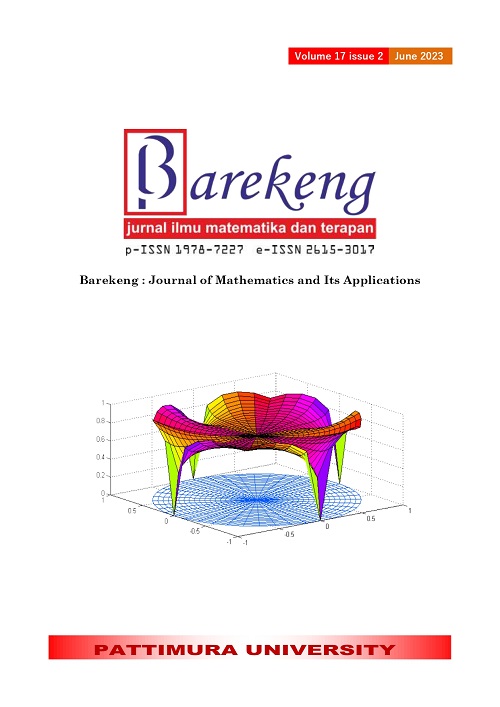A MULTI-ITEM INVENTORY MODEL WITH VARIOUS DEMAND FUNCTIONS CONSIDERING DETERIORATION AND PARTIAL BACKLOGGING
Abstract
Inventory management is an important thing to be considered in order to run the activities of a company smoothly. By considering deterioration factor, partial backlogging policy and different type of demand functions, we develop a mathematical model for multi-item inventory system. In this paper, three inventory models with constant deterioration, partial backlogging, with various demand functions are developed. We consider inventory-dependent demand, time-dependent demand and exponential demand function in each model. In addition, we also consider the replenishment policies for those three items, viz. individual replenishment, joint replenishment and combination both individual and joint replenishments. Sensitivity analysis of the models is also performed, and we found that the ordering cost greatly affects the total inventory cost when comparing the available replenishment policies.
Downloads
References
P. F. Johnson, Purchasing and Supply Management, New York: McGraw-Hill Eucation, 2020.
F. W. Harris, "How many parts to make at once," The Magazine of Management, vol. 10, no. 2, pp. 135-136, 152, 1913.
M. Akan, E. Albey and M. G. Guler, "Optimal pricing and inventory strategies for fashion products under time-dependent interest rate and demand," Computers & Industrial Engineering, vol. 154, p. 107149, April 2021.
M. Pervin, S. K. Roy and G.-W. Weber, "Analysis of inventory control model with shortage under time-dependent demand and time-varying holding cost including stochastic deterioration," Annals of Operations Research, vol. 260, pp. 437-460, 2018.
L. A. San-Jose, J. Sicilia, V. Pando and D. Alcaide-Lopez-de-Pablo, "An inventory system with time-dependent demand and partial backordering under return on inventory investment maximization," Computers & Operations Research, vol. 145, p. 105861, September 2022.
H. K. Alfares and A. M. Ghaithan, "Inventory and pricing model with price-dependent demand, time-varying holding cost, and quantity discounts," Computers & Industrial Engineering, vol. 94, pp. 170-177, April 2016.
C. Canyakmaz, S. Ozekici and F. Karaesmen, "An inventory model where customer demand is dependent on a stochastic price process," International Journal of Production Economics, vol. 212, pp. 139-152, June 2019.
S. C. Das, A. Zidan, A. K. Manna, A. A. Shaikh and A. K. Bhunia, "An application of preservation technology in inventory control system with price dependent demand and partial backlogging," Alexandria Engineering Journal, vol. 59, no. 3, pp. 1359-1369, June 2020.
S. K. INDRAJITSINGHA, P. Raulo, P. SAMANTA, U. MISRA and L. K. RAJU, "An EOQ Model of Selling-Price-Dependent Demand for Non-Instantaneous Deteriorating Items during the Pandemic COVID-19," Walaikak Journal of Science and Technology, vol. 18, no. 12, p. 13398, June 2021.
O. Jadidi, M. Y. Jaber and S. Zolfaghari, "Joint pricing and inventory problem with price dependent stochastic demand and price discounts," Computers & Industrial Engineering, vol. 114, pp. 45-53, December 2017.
P. Mahata, G. C. Mahata and A. Mukherjee, "An ordering policy for deteriorating items with price-dependent iso-elastic demand under permissible delay in payments and price inflation," Mathematical and Computer Modelling of Dynamical Systems, vol. 25, no. 6, pp. 575-601, 2019.
Z. M. Teksan and J. Geunes, "An EOQ model with price-dependent supply and demand," International Journal of Production Economics, vol. 178, pp. 22-33, August 2016.
V. Vora and U. Gothi, "Deterministic Inventory Model for Deteriorating Items with Price," International Journal of Scientific Research in Research Paper, vol. 7, no. 6, pp. 20-28, December 2020.
L. E. Cárdenas-Barrón, A. A. Shaikh, S. Tiwari and G. Treviño-Garza, "An EOQ inventory model with nonlinear stock dependent holding cost, nonlinear stock dependent demand and trade credit," Computers & Industrial Engineering, vol. 139, p. 105557, January 2020.
M. Nockowska-Rosiak, P. Hachula and E. Schmeidel, "Stability of equilibrium points of demand-inventory model with stock-dependent demand," Journal of Difference Equations and Applications, vol. 22, no. 10, pp. 1490-1500, 2016.
N. Tashakkor, S. H. Mirmohammadi and M. Iranpoor, "Joint optimization of dynamic pricing and replenishment cycle considering variable non-instantaneous deterioration and stock-dependent demand," Computers & Industrial Engineering, vol. 123, pp. 232-241, September 2018.
T. L. Urban, "Inventory models with inventory-level-dependent demand: A comprehensive review and unifying theory," European Journal of Operational Research, vol. 162, no. 3, pp. 792-804, May 2005.
F. Wang, X. Fang, X. Chen and X. Li, "Impact of inventory inaccuracies on products with inventory-dependent demand," International Journal of Production Economics, vol. 177, pp. 118-130, July 2016.
T. Limansyah and D. Lesmono, "A Mathematical Model for Inventory and Price-Dependent Demand with All-Units Discount," IOP Conf. Series: Journal of Physics, vol. 1490, p. 012051, 2020.
T. Limansyah and D. Lesmono, "A mathematical model for inventory-dependent demand and backorder," in AIP Conference Proceedings, 2022.
N. Loedy, D. Lesmono and T. Limansyah, "An Inventory-Dependent Demand Model with Deterioration, All-Units Discount, and Return," IOP Conf Series: Journal of Physics, vol. 1108, p. 012010, 2018.
A. Macías-López, L. E. Cárdenas-Barrón, R. E. Peimbert-Garcia and B. Mandal, "An Inventory Model for Perishable Items with Price-, Stock-, and Time-Dependent Demand Rate considering Shelf-Life and Nonlinear Holding Costs," Mathematical Problems in Engineering, vol. 2021, pp. 1-36, 2021.
M. Palanivel and M. Suganya, "Partial backlogging inventory model with price and stock level dependent demand, time varying holding cost and quantity discounts," Journal of Management Analytics, vol. 9, no. 1, pp. 32-59, 2022.
V. Pando, L. A. San-José, J. Sicilia and D. Alcaide-López-de-Pablo, "Maximization of the return on inventory management expense in a system with price- and stock-dependent demand rate," Computers & Operations Research, vol. 127, p. 105134, March 2021.
S. Saha and N. Sen, "An inventory model for deteriorating items with time and price dependent demand and shortages under the effect of inflation," International Journal of Mathematics in Operational Research, vol. 14, no. 3, pp. 377-388, 2019.
N. H. Shah and M. K. Naik, "Inventory Policies for Price-Sensitive Stock-Dependent Demand and," International Journal of Mathematical, Engineering and Management Sciences, vol. 3, no. 3, pp. 245-257, 2018.
N. H. Shah, K. Rabari and E. Patel, "A Deteriorating Inventory Model under Overtime Production and Credit Policy for Stock- and Price Sensitive Demand Function," Operational Research in Engineering Sciences: Theory and Applications, vol. 5, no. 2, pp. 85-98, August 2022.
M. A.-A. Khan, A. A. Shaikh, I. Konstantaras, A. K. Bhunia and L. E. Cárdenas-Barrón, "Inventory models for perishable items with advanced payment, linearly time-dependent holding cost and demand dependent on advertisement and selling price," International Journal of Production Economics, vol. 230, p. 107804, December 2020.
T. Limansyah, D. Lesmono and I. Sandy, "Economic order quantity model with deterioration factor and all-units discount," IOP Conf: Series: Journal of Pyhsics, vol. 1490, p. 012052, 2020.
M. Önal, A. Yenipazarli and O. E. Kundakcioglu, "A mathematical model for perishable products with price- and displayed-stock-dependent demand," Computers & Industrial Engineering, vol. 102, pp. 246-258, December 2016.
D. Dutta and P. Kumar, "A partial backlogging inventory model for deteriorating items with time-varying demand and holding cost," International Journal of Mathematics in Operational Research, vol. 7, no. 3, pp. 281-296, 2015.
D. Dutta and P. Kumar, "A partial backlogging inventory model for deteriorating items with time-varying demand and holding cost: An interval number approach," Croatian Operational Research Review, vol. 6, no. 2, pp. 321-334, 2015.
Copyright (c) 2023 Tania Joviani, Dharma Lesmono, Taufik Limansyah

This work is licensed under a Creative Commons Attribution-ShareAlike 4.0 International License.
Authors who publish with this Journal agree to the following terms:
- Author retain copyright and grant the journal right of first publication with the work simultaneously licensed under a creative commons attribution license that allow others to share the work within an acknowledgement of the work’s authorship and initial publication of this journal.
- Authors are able to enter into separate, additional contractual arrangement for the non-exclusive distribution of the journal’s published version of the work (e.g. acknowledgement of its initial publication in this journal).
- Authors are permitted and encouraged to post their work online (e.g. in institutional repositories or on their websites) prior to and during the submission process, as it can lead to productive exchanges, as well as earlier and greater citation of published works.






1.gif)



